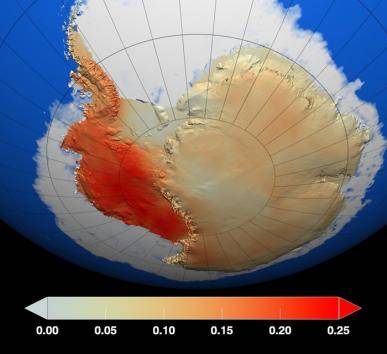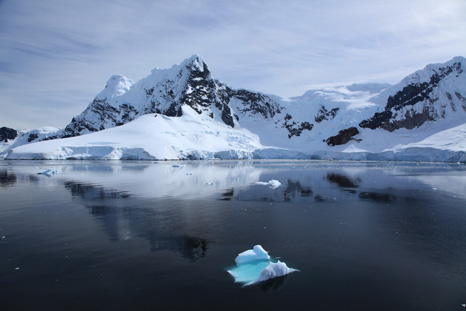Longer Antarctica Summer Increases Ice Melting
And Africa Farmers Face Slashed Yields
By Countercurrents.org
30 March, 2013
Countercurrents.org

Citing British scientists a London datelined UPI report said [1]:
The length of the summer melt season in part of Antarctica has been getting longer, and increasing ice loss, for the last 60 years.
The summer melting has been linked to the rapid break-up of ice shelves in the area and rising sea levels, the scientists said.
Researchers with the British Antarctic Survey reported the Antarctic Peninsula -- a mountainous region extending northwards towards South America -- is warming much faster than the rest of Antarctica, with temperatures up by 5 degrees F since the 1950s.
The increase on the peninsula is three times the global average during the same time period, a release from the survey said Tuesday, and has resulted in summer temperatures high enough for snow to melt.
Survey researchers analyzed records from 30 weather stations on the peninsula.
"We found a significant increase in the length of the melting season at most of the stations with the longest temperature records" Nick Barrand says. "At one station the average length of the melt season almost doubled between 1948 and 2011."
This summer melting can enlarge cracks in floating ice shelves, which can contribute to their retreat or collapse, the researchers said.
It also increases the speed at which glaciers flow to the sea, they said.
Citing the research finding published in the Journal of Geophysical Research RTCC (Response To Climate Change) reported [2]:
The additional melting has been caused by a strengthening of local westerly winds causing the warmer air above the ocean to be swept up and over the mountainous peninsula.
Flickr/LiamQuinn)
The Antarctic Peninsula has warmed three timesmore than the global average
The meltwater makes a contribution to rising sea levels but is has secondary effects too.
Melting and refreezing water widens cracks in the ice that can accelerate its break up. In the case of floating ice shelves, their collapse can accelerate the advance of glaciers, which can surge forward when ice ahead of them breaks away.
The Peninsula , which curls north towards South America , has warmed by 3°C since 1950, three times the global average.
Barrand used satellite data to map the melting and matched it with the records of 30 weather stations. They found a strong correlation with a regional climate model, RACMO2.
“We found that the model was very good at reproducing the pattern and timing of the melt, and changes in melting between years. This increases confidence in the use of climate models to predict future changes to snow and ice cover in the Antarctic Peninsula ,” said Dr Barrand who now works for the University of Birmingham .
North and South, the two polar regions are very different with the South Pole dominated by the Antarctic continent while the Arctic is a mix of land and sea.
Claims that gains in the Antarctic sea ice balance out losses in the Arctic have been rejected by polar experts.
Africa farmers
On impact of global warming on farmers in Africa Bernard Appiah reported [3]:
In Africa , climate change could slash crop yields and increase reliance on irrigation in the 2030s, but in some regions, including Southern Africa , agricultural output could increase and farming become less dependent on water, according to a study published on February 27, 2013 .
The researchers, based in Canada , China and Switzerland , set out to predict the combined impact of climate change on food production and water levels globally, regionally and locally.
"Such a study not only provides large-scale [global and continental] analysis, but also in-depth spatial details that can help decision-makers deal with climate mitigation and adaptation locally," says lead author Junguo Liu, a professor of hydrology at the Beijing Forestry University, China.
The researchers used global datasets for soil data, climate, fertilizer inputs, and crops, taking into account whether they were irrigated or rain-fed. Using eight climate scenarios, they estimated the yields of three staples - maize, rice and wheat - and water use for the short-term 2030s period and the long-term 2090s one. They then compared these with figures obtained in the 1990s.
"Southern and eastern parts of Sub-Saharan Africa, along the Rift Valley, may profit in the short run from climate change regarding yields for the three staple food crops," says Christian Folberth, a co-author of the study, and a research scientist with the Swiss Federal Institute of Aquatic Science and Technology. "Western and central parts, on the other hand, show a slight negative impact."
The researchers found that regions that presently have sufficient water, including south-eastern parts of Latin America , will depend more on irrigation in the 2030s.
In contrast, regions with insufficient water, including most parts of Sub-Saharan Africa, will depend less on irrigation for water because of favorable temperatures.
Folberth says that, until the 2030s, the increase in atmospheric carbon dioxide and modest changes in temperature may lead to yield increases in some regions if temperatures do not exceed crop temperature thresholds. By the 2090s, however, the thresholds may be reached resulting in low yields.
The researchers have issued a warning about this double-edged sword. "The positive impacts in the short run can help alleviate food shortage problems," the study says.
"However, they may distract [from] attention paid to adapting and mitigating measures to combat the long-term negative impacts of climate change."
But Richwell Musoma, an irrigation agronomist at Zimbabwe 's Department of Irrigation Development, says the study's findings are unlikely to be experienced in most African countries.
He cites a 2011 Food and Agricultural Organization study that predicted yields from agriculture in Sub-Saharan Africa will decline by between 20 percent and 50 percent by 2050.
Musoma also notes that, due to erratic rainfall patterns experienced in most African countries, irrigation has become important, and thus water use is likely to increase in the 2030s.
Source:
[1] March 27, 2013 , “Warming bringing longer Antarctic melting”,
[2] March 27, 2013 , “Summer melt increasing on the Antarctic Peninsula ”,
http://www.rtcc.org/summer-melt-increasing-on-the-antarctic-peninsula/
[3] allAfrica, March 26, 2013 , “ Africa : Climate Change Could Be Double-Edged Sword for Farmers”, [The article has been produced by SciDev.Net's Sub-Saharan Africa news desk.
References: PLOS ONE doi:10.1371/journal.pone.0057750 (2013)]
http://allafrica.com/stories/201303280053.html?viewall=1
Comments are moderated



